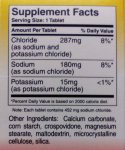Turns out that these are prescription-only in the UK and that I'm about to get a prescription!
Wow, I'm surprised salt tablets are prescription only! Are you sure you can't get them online, e.g. Amazon?
They are sold over the counter here in the USA. ThermoTabs is one brand name I remember. ProHealth sells a different brand but I forgot the name. These are a bit better than the ones you get from the doctor (I did get some of those once). The tablets are smaller and they also have a small amount of potassium in them.
Here's a photo of the Thermotabs ingredients:

(click to make bigger)
I asked whether I need to take potassium to balance my electrolytes and was told I didn't. This surprised me but I'm a biological ignoramus.
I think potassium is important but that's just me. I have a time released potassium prescription (some generic version of
Klor-Con, 750 mg) that helps me. But I'm also on fludrocortisone, a drug that helps the patient hold on to sodium at the expense of potassium. When I was taking over the counter potassium it was not enough and did not help much. After I started taking RX potassium it was better.
[Edit - Oops, I only read your second post but missed the first where you said electrolyte drinks don't help you. So you can skip this bit]
Another option for potassium is to find an electrolyte drink that suits you. There are powdered mixes. Or to get both sodium and potassium you could try the clear, unflavored Pedialyte (I used to get the generic version from Walgreens, not sure what brands you might have over there). Here are the ingredients:
To save money, and also save the environment (all those plastic 1-liter bottles), I mix up my own version at home. I use table salt (non-iodized) and potassium chloride powder (salt substitute). And if I'm skipping dinner then I throw in a spoon of powdered dextrose (aka, glucose). Some form of simple carbohydrate seems to help the sodium get absorbed more quickly. And dextrose is easier to digest than table sugar (sucrose).
Any experience, good, bad or indifferent?
If they worked for you, how long did it take to see an improvement?
I don't think salt tablets alone would have helped me much but along with fludrocortisone and extra water (the idea being to increase blood volume) they did help. But adding the midodrine helped even more.
I don't have a very sensitive stomach but I always took the salt tablets with meals, just in case.
I can't remember how long it took before I saw an effect (so many years ago). And my case was much different because I started 3 things all together - fludrocortisone, salt tablets, and extra water - as a combined treatment.
PS. The original Pedialyte image I included was wrong - new info attached.

